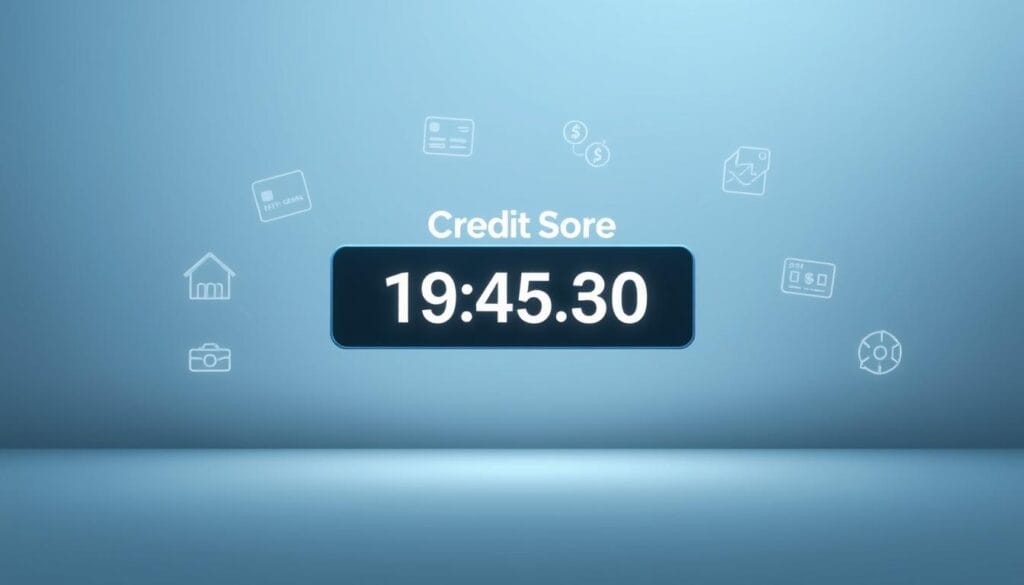Did you know that nearly 1 in 5 young adults have no credit history? This can make it challenging for them to secure their first apartment, car loan, or other financial products. Starting early can make a significant difference.
As a parent or guardian, you play a vital role in shaping your child’s financial literacy. Teaching them about responsible financial habits and helping them build credit can set them up for long-term financial success.
Although children under 18 cannot legally have their own credit cards, there are steps you can take to help them build a strong credit history once they reach the age of majority. Understanding the legal framework around minors and credit is crucial.
Key Takeaways
- Starting to build credit early can give young adults a significant advantage when applying for financial products.
- Parents and guardians play a crucial role in teaching financial literacy and monitoring credit reports.
- There are legal limitations to consider when building credit for minors.
- Practical strategies can help children build credit responsibly.
- Financial education should be tailored to different age groups.
Why Building Credit Early Matters
![]()
The importance of building credit early cannot be overstated, as it lays the groundwork for a lifetime of financial health. By establishing a good credit history, your child can enjoy a wide range of financial opportunities in the future.
The Importance of a Strong Credit Score
A strong credit score is crucial for securing loans and credit at favorable interest rates. Having a good credit score can save your child thousands of dollars over their lifetime by qualifying them for better interest rates on car loans, mortgages, and credit cards. For instance, a good credit score can make a significant difference when applying for a mortgage, as it directly affects the interest rate they’ll qualify for.
| Credit Score Range | Interest Rate | Loan Terms |
|---|---|---|
| 750-850 | 3.5% | Favorable |
| 700-749 | 4.0% | Good |
| 650-699 | 4.5% | Fair |
Long-term Financial Benefits for Your Child’s Future
Building credit early provides long-term financial benefits, including access to better loan terms and lower interest rates. This can lead to significant savings over a lifetime, making it easier for your child to achieve their financial goals, such as buying a home or financing their education. For more information on how to improve credit scores, you can visit top fintech apps for credit score.
Moreover, a good credit history can also impact other areas of life, such as renting an apartment or even employment opportunities, as some employers use credit checks as part of their hiring process.
Understanding Credit Basics for Teens

Understanding credit basics is essential for teens to establish a positive financial identity. As they approach adulthood, teens need to grasp how credit works to make informed decisions about their financial future.
What Makes Up a Credit Score
A credit score is composed of five key factors. These are:
- Payment history (35% of the score): Making timely payments positively impacts this component.
- Credit utilization ratio (30% of the score): Keeping credit usage low compared to the credit limit is beneficial.
- Length of credit history (15% of the score): A longer credit history is generally more positive.
- Credit mix (10%): Having a variety of credit types (e.g., credit cards, loans) can be beneficial.
- New credit inquiries (10%): Applying for too much new credit in a short period can negatively impact the score.
For more information on managing finances effectively, you can check out top savings accounts for kids to understand how saving can complement credit management.
How Credit Reports Work for Minors
For minors, credit reports typically do not contain much information unless there has been identity theft. To obtain a credit report for a minor, parents can contact the three major credit bureaus (Equifax, Experian, and TransUnion) online or by mail, providing identifying information about their child to determine if a credit report exists. This process helps ensure that no unauthorized credit activity is associated with their child’s identity.
Understanding these basics can help teens and their parents navigate the complexities of credit and make informed decisions about their financial health.
Legal Considerations for Minors and Credit
Understanding the legal framework surrounding minors and credit is crucial for parents who want to help their children establish a strong credit history. The law imposes certain limitations on minors’ ability to obtain credit, which parents should be aware of to make informed decisions.
Age Restrictions on Credit Products
The age restrictions on credit products are designed to protect young consumers from accumulating debt before they have the financial maturity to manage it. In the United States, individuals under the age of 21 face specific challenges when trying to obtain credit cards or other credit products. For instance, an 18-year-old cannot get a credit card independently unless they have a co-signer or can prove independent income.
- Minors cannot legally access credit products on their own.
- Young adults between 18-21 need a co-signer or income verification to get a credit card.
- Parents can add their children as authorized users on their accounts.
The Credit CARD Act and Its Impact
The Credit CARD Act of 2009 significantly impacted the credit landscape for young consumers. This legislation made it more difficult for individuals under 21 to obtain credit cards without a co-signer or proof of independent income. The Act aimed to protect young consumers from the potential pitfalls of credit card debt by ensuring they have the financial means to manage their credit obligations.
| Age Group | Credit Card Eligibility | Requirements |
|---|---|---|
| Under 18 | No | Not eligible |
| 18-21 | Conditional | Co-signer or income verification |
| 21 and above | Yes | Standard credit check |
For more information on managing credit and finding suitable loan options, you can visit this resource to learn about bad credit loans and how to get approved.
How to Establish Credit for Children Under 18

Establishing credit for children under 18 is a crucial step in their financial journey, and there are several effective methods to achieve this. Parents can play a significant role in helping their children build a strong credit foundation from a young age.
Adding Your Child as an Authorized User
One of the most effective ways to start building credit for your child is by adding them as an authorized user on one of your credit card accounts. This means your child can use your credit card, and with responsible use, they can begin to build their own credit history. It’s essential to choose a credit card issuer that reports authorized user activity to the credit bureaus. Some major credit card companies have minimum age requirements, so it’s crucial to check their policies before adding your child.
The benefits of being an authorized user include the potential for a positive credit history if the primary cardholder manages their credit responsibly. However, it’s also important to be aware of the potential risks, such as negative impacts on your child’s credit if you miss payments or accumulate high balances.
- Choose a credit card with a good payment history.
- Set spending limits to teach your child about responsible spending.
- Monitor your child’s credit report to ensure it’s being reported correctly.
Opening a Checking or Savings Account
While not directly impacting credit scores, opening a checking or savings account with your child can be a valuable step in teaching them about financial responsibility. Managing such an account responsibly helps children learn about money management in the real world. For more information on managing finances and credit options, you can visit financial resources for additional guidance.
Establishing Employment History
For teenagers, establishing employment history can indirectly support their future credit applications by demonstrating income stability and financial responsibility. Encouraging your teen to take on a part-time job or engage in entrepreneurial activities can be beneficial. This not only teaches them about earning money but also about managing it, which is crucial for creditworthiness.
By guiding your child through these steps, you can help them build a strong financial foundation that will benefit them throughout their lives.
Building Financial Literacy Alongside Credit

Building credit for children under 18 goes hand-in-hand with teaching them financial literacy. As children grow, understanding the value of money and how to manage it effectively is crucial for their financial stability in the future.
Teaching Money Management Skills
Teaching children money management skills is foundational to their financial literacy. This includes budgeting, saving, and understanding the difference between needs and wants. By involving your child in daily financial decisions, such as planning for groceries or comparing prices, you’re laying the groundwork for strong financial habits. For more information on educational platforms that can aid in this process, you can visit top educational finance platforms for 2025.
Setting Financial Goals with Your Child
Setting financial goals with your child is another critical aspect of their financial education. By working together to set achievable goals, you can motivate your child to practice responsible money management. This collaborative process not only teaches them about the importance of saving for future objectives but also introduces them to the concept of using credit wisely to achieve larger goals. It’s a practical way to demonstrate how credit can be a tool for financial success when used responsibly.
Monitoring and Protecting Your Child’s Credit
Monitoring your child’s credit report is a proactive step in safeguarding their financial health and preventing potential fraud. Children are increasingly targeted by identity thieves due to their clean credit histories. As a parent, it’s crucial to be vigilant and take steps to protect your child’s credit.
How to Check Your Child’s Credit Report
To check if your child has a credit report, you’ll need to contact the three major credit bureaus: Equifax, Experian, and TransUnion. You can do this online or by mail. You’ll need to provide identifying information about your child, such as their name, date of birth, and Social Security number, as well as your own information and identification. This process helps determine whether a credit report exists for your child.
- Contact each credit bureau individually to request a credit report for your child.
- Provide the required documentation, including proof of your identity and your child’s information.
- Review the report carefully for any suspicious activity or errors.
Freezing Your Child’s Credit to Prevent Identity Theft
A credit freeze is a powerful tool to prevent identity theft. By freezing your child’s credit, you can prevent thieves from opening new accounts in their name. To implement a credit freeze, you’ll need to contact each of the three major credit bureaus and provide the required documentation. This step can provide peace of mind and add an extra layer of protection for your child’s financial future.
Warning signs that your child’s identity may have been compromised include receiving credit card offers or collection calls addressed to your child. If you suspect identity theft, you’ll need to take immediate action, including filing police reports and working with the credit bureaus to remove any fraudulent accounts.
Transitioning to Independent Credit Use
As your child approaches adulthood, it’s crucial to guide them in transitioning to independent credit use. This period, typically between ages 18 and 21, is critical for establishing their credit profile and financial independence.
Preparing Teens for Their First Credit Card
Before handing over the reins, it’s essential to prepare your teen for their first credit card. Start by using the authorized user card under your supervision. This hands-on experience will help them understand the importance of timely payments and managing debt. Discuss the implications of interest rates and the benefits of paying the balance in full each month.
- Practice making regular payments to avoid late fees.
- Understand the impact of credit utilization on their credit score.
- Discuss the importance of monitoring their credit report.
Credit Options for Young Adults (18-21)
For young adults with limited credit history, several credit card options are available. Student credit cards are designed for those with no credit history, making them a viable option. Alternatively, secured credit cards require a security deposit, which typically equals the credit limit, teaching responsible spending habits. For those looking for other avenues, credit builder loans can be a useful tool.
When evaluating credit card offers, it’s crucial to understand the terms, including APR, grace periods, and fee structures. Young adults should be cautious of debt accumulation and strive to pay more than the minimum payment to avoid prolonged interest payments.
Conclusion: Setting Your Child Up for Financial Success
Helping your child establish a good credit score can open doors to better loan terms, housing opportunities, and financial stability. By making your child an authorized user on your credit card, you can give them a head start in building their credit history. This approach, combined with teaching financial responsibility, can significantly impact their financial future.
As your child grows, it’s essential to continue the conversation about credit and money management. This includes monitoring their credit report, understanding the importance of timely payments, and making informed decisions about credit products. For more advanced tips on managing credit, you can explore resources like AI-driven credit score tips.
Key takeaways include: Establishing credit early, teaching financial literacy, and monitoring credit reports. By following these steps, you can help your child navigate the complex financial world with confidence.
By starting early and being proactive, you can give your child the tools they need to achieve financial success and stability in the long run.

